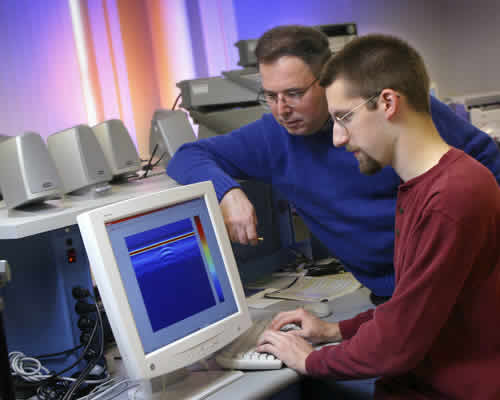Senior Mark Kolba (Chelmsford, Mass.) is conducting research at Lafayette to diminish the devastation caused by forgotten land mines.
For his honors thesis, he is working on technology that could greatly increase the area covered in a given period by those searching for mines.
“An estimated 100 million land mines lie uncleared in fields around the world,” says Kolba. “These mines kill or injure more than 20,000 civilians each year. The process of clearing the mines is painfully slow. For each mine detected, there are often 1,000 other non-mine objects detected.”
An electrical and computer engineering major, Kolba is working under the guidance of Ismail Jouny, professor and head of electrical and computer engineering, to fine-tune the images produced by ground-penetrating radar.
Jouny has published numerous articles in academic publications, many co-authored with Lafayette students. He has served as a summer faculty fellow at the U.S. Naval Air Base in Patuxent River, Md., and Naval Underwater Warfare Center in Newport, R.I. Jouny also has a U.S. patent pending, has served as a consultant in industry, and has been listed in Who’s Who in Science & Technology.
“Ground-penetrating radar takes a picture below the surface of the earth by shooting energy into the ground and measuring the energy that comes back,” says Kolba. The technology serves as a window to the future of demining but must be refined.
The unclear images produced by ground-penetrating radar make it difficult to discern whether an object is a mine, bullet casing, or belt buckle. Kolba is eliminating this uncertainty using a software program called MATLAB. The technology is able to remove irrelevant parts of the radar image so objects may be easily identified.
Equipped with just a radar detector and iron prodder, deminers can only clear about 50 square meters of land per day. Kolba expects the addition of a ground-penetrating radar device to significantly increase that area.
“The results I have obtained so far have been very promising, and next semester I look forward to continuing my work and achieving final results that will be of value to those in the demining field.”
Kolba says that he has been “blessed” to work with Jouny. “Professor Jouny is extremely knowledgeable about signal and image processing, and his expertise has played a central role in this work. I’m working on a thesis that has pressing relevance in the real world, and that makes my work even more satisfying.”
Last spring, Ashley Wesmiller ’03, an electrical and computer engineering major from Pittsburgh, Pa., scanned images of land mines and other objects and wrote computer codes to differentiate between the images. Her work laid the foundation for Kolba’s research. Wesmiller collaborated with Jouny through Lafayette’s distinctive EXCEL Scholars program, in which students work with faculty on research while earning a stipend.
As a benefit of being a participant in Lafayette’s Marquis Scholars program, Kolba traveled to Ireland to take a class called The Land and Landscape of Ireland free of charge. Selected from Lafayette’s most promising applicants, Marquis Scholars receive special financial aid and additional benefits, including distinctive educational experiences, cultural activities in major U.S. and Canadian cities, and mentoring programs with faculty. Kolba also received the Eugene P. Chase Phi Beta Kappa prize, awarded to someone who has demonstrated scholarship as a first-year student.

A National Leader in Undergraduate Research. Mark Kolba ’03 presented honors research he did with Ismail Jouny, professor of electrical and computer engineering, at the International Society for Optical Engineering’s AeroSense Symposium.
